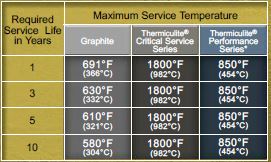A breakthrough in both heat and chemical resistance, Thermiculite Critical Service materials are rated for temperatures up to 1800ºF and have passed the API 607 fire test.
Conventional graphite gaskets are susceptible to attack by oxidizing agents. This occurs from oxygen flowing through pipes, or simply from oxygen present in the atmosphere surrounding the flange. The rate at which graphite oxidizes depends on the application temperature and the concentration of oxygen present. But when it does happen – the end result is seal failure.
The unique composition of Thermiculite® gasket material ensures that the seals maintain their integrity at maximum service temperatures far exceeding that of graphite. There really is no comparison – Ccoose Thermiculite and eliminate the risk of oxidation altogether.
Available in spiral wound and Flexpro™ (Kammprofile) facing styles, they provide safer, more cost-effective alternatives to industrial sealing problems where ultra-high heat resistance is critical; ex: oxidation of graphite in nuclear power exhaust systems.
They are suitable for replacing aramid, glass, and carbon fiber; PTFE; and graphite gaskets in a number of industrial applications.
Thermiculite 715 Fiber Sheet
High-performance coreless sheet material. Provides total freedom from oxidation. Broad chemical compatibility range. Fire safe. Genuine opportunity for gasket standardization and inventory consolidation. Wide service capability.
Thermiculite 815 Sheet
High temperature sheet reinforced with a 0.004˝, 316L stainless steel tanged core. Provides total freedom from oxidation. Chemical compatibility exceeds graphite. Fire safe with proven global track record.
Thermiculite 835 Spiral Wound
- High temperature filler material for spiral wound gaskets
- Cryogenics to 1800ºF / 982ºC
- Class 150 to 2500
Thermiculite 845 Flexpro™ Kammprofile

- High temperature facing material for kammprofile gaskets
- Cryogenics to 1800ºF/982ºC
- Class 150 to 2500
Thermiculite 894 Static Seal
- Typical uses: Flexible static seal, ON/OFF valves with low actuation.
- Max Temperature: 1900°F (1050°C)
- pH Limits: 0-14